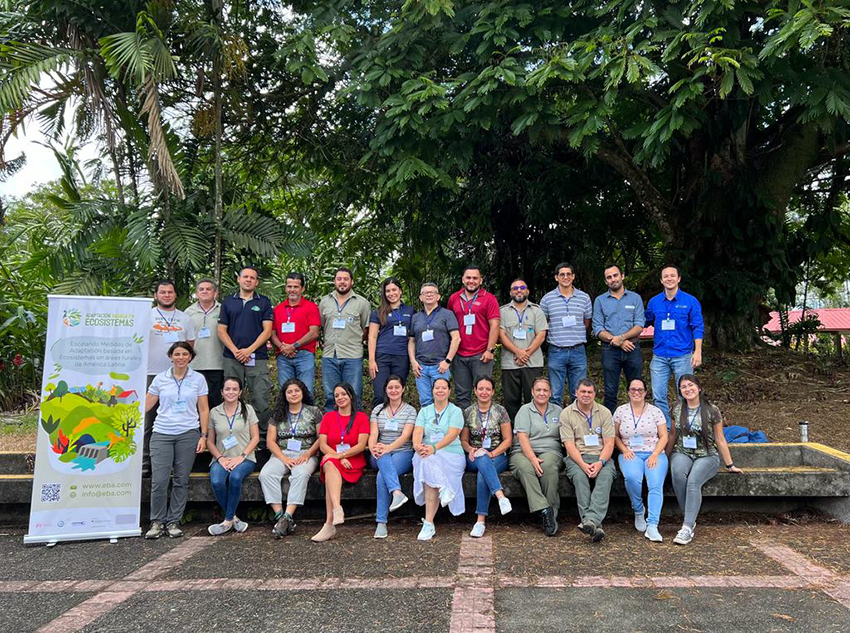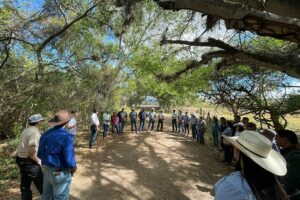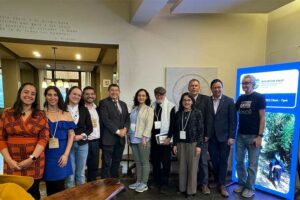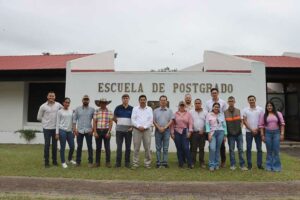The course on Ecosystem-Based Adaptation leaves its mark in Costa Rica

- The initiative is part of the Scaling up Ecosystem-Based Adaptation Measures in Rural Latin America (EbA LAC) program and aims to train key actors to support the replication of AbE measures in their communities and workplaces.
November 22, 2023. In the Barra de Tortuguero area, 22 young representatives from Participatory Environmental Monitoring (MAP), from the Ministry of Environment and Energy through the National System of Conservation Areas (SINAC), join the objectives of the Training of Trainers in Ecosystem-Based Adaptation course, within the framework of the development and capacity-building strategy of the EbA LAC program.
The course seeks to reinforce the technical capacities and soft skills of individuals who can work as multipliers in their organizational, community, or institutional roles to promote actions against climate change with a focus on Ecosystem-Based Adaptation (AbE), in order to reach more communities implementing these alternatives.
This is how the alliance and training of 22 MAP youth emerged, who, through Andrés González, one of the first course multipliers and also in charge of Citizen Participation at the Tortuguero Conservation Area (ACTo), received training in AbE measures. They were accompanied in this effort by Heidy Zúñiga and Sebastián Bonilla, also officials of ACTo.
"The course seeks precisely that, to have multipliers in different sectors and civil society, so that their knowledge in adaptation, ecosystem management, and landscape management is strengthened to address in a holistic way one of the major issues affecting society, such as climate change," said Arlene López, coordinator on behalf of CATIE (Tropical Agricultural Research and Higher Education Center) for the EbA LAC program.
González, on his part, stated, "All the boys and girls are between 9 and 16 years old and are our spearhead for our environmental education, citizen participation strategies, and now, to contribute to the implementation of Ecosystem-Based Adaptation measures."
The course structure consists of six modules distributed between face-to-face and virtual sessions, in which participants not only learn about key topics such as climate change, climate justice, governance, among others but also includes a high percentage of teachings focused on soft skills, including communication, teamwork, and active listening.
Paving the way
Carlos Barrantes, institutional coordinator of SINAC in the EbA LAC program, expressed that it is very important for SINAC officials to receive training, as part of their duties involves advising on environmental issues, and now they can promote or disseminate Ecosystem-Based Adaptation.
Similarly, Magally Castro, who works in the Central Conservation Area of SINAC and coordinates the Regional Program of Biological Corridors, considers that working with the 12 biological corridors, which function as local committees with high citizen participation, is the ideal space to contribute to the implementation of more training on the AbE topic.
"I would love to start applying it in a specific corridor, which is the Interurban Biological Corridor Río Torres because they manage it through the micro-watershed," said Castro. "It is a group that has very visionary challenges, and I think that ecosystem-based adaptation would help us see everything in the context of the micro-watershed," she added.
About the course
The Training of Trainers in Ecosystem-Based Adaptation course began in Costa Rica on September 27 and 28 in-person sessions at EARTH University and has been developing virtually to address most of the thematic contents. It is scheduled to conclude on November 24 in an in-person session at CATIE, where participants will present the final work, demonstrating competencies acquired as trainers on the AbE topic.
This course is part of the actions within the EbA LAC program, funded by the German Federal Ministry for the Environment, Nature Conservation, Nuclear Safety, and Consumer Protection (BMUV) through its International Climate Initiative (IKI), implemented by the German Cooperation - GIZ - as the lead agency, in association with the IUCN (International Union for Conservation of Nature) and CATIE (Tropical Agricultural Research and Higher Education Center). In Costa Rica, close coordination is maintained with MINAE and SINAC.
The EbA LAC program aims to increase the resilience capacity to climate change of vulnerable communities and ecosystems in rural areas of Costa Rica, Guatemala, and Ecuador.
Written by:
Marianela Argüello L.
Communication and Knowledge Management Officer
Unit for Environmental Economics and Sustainable Agribusiness (UEAAS/EfD)
CATIE
marguello@catie.ac.cr
Tag:adaptación, cambio climático, capacitación, CATIE, Costa Rica., cursos, EbA LAC, ecosistemas, formadores, MAP, MINAE, SINAC



